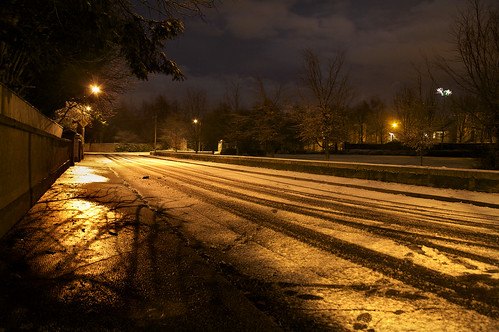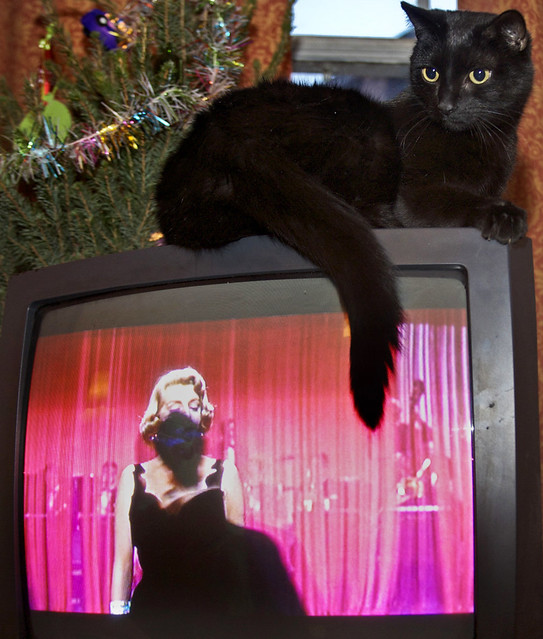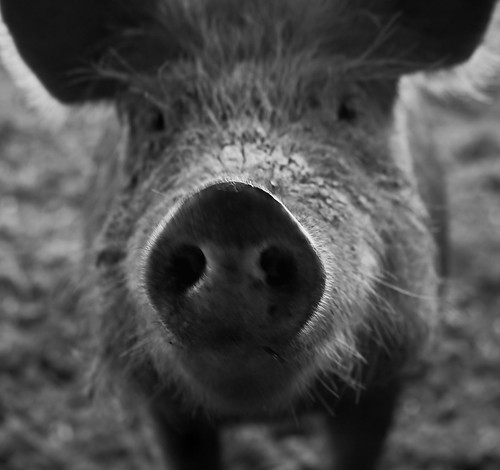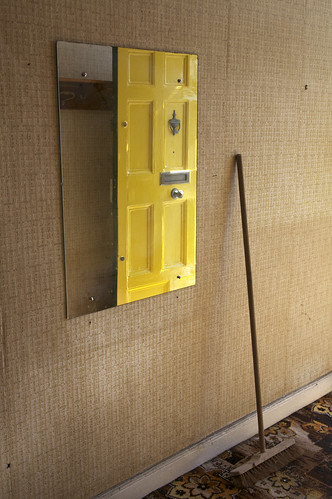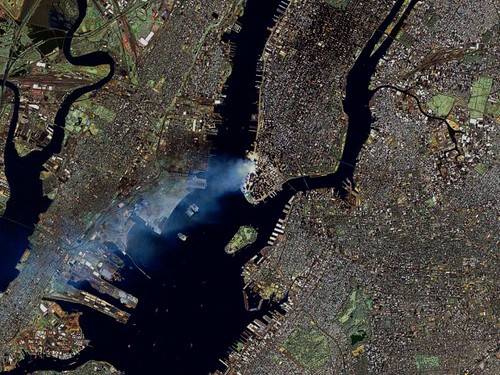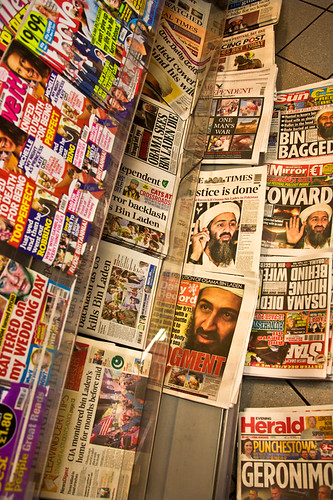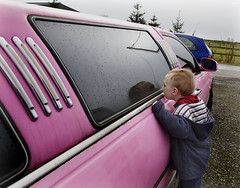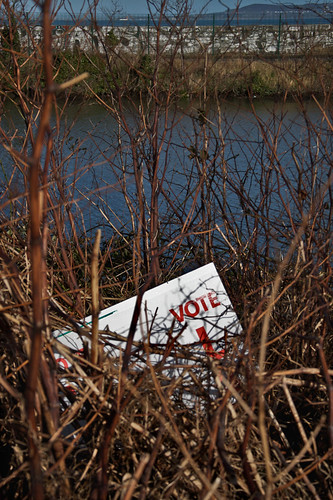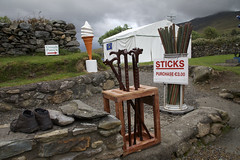 Than longen folk to goon on pilgrimages
Than longen folk to goon on pilgrimages…
Except it isn’t April but the end
of a dark, damp summer.
**
So we drive through Saturday and pull in
at the evening car park: artic lorries, shops
for fast food, ice cream, the great white elephantantry
of shiny statues, rosaries, scapulars, all
the luggage you might need for what loured ahead:
blue-green slopes decapitated by cloud,
the most ominous-looking mountain I ever dreamed
of setting foot on
**
yet already there, above the burger stand,
the variously coloured trickle is in place:
people marking a zigzag route, a bright
sprinkle of hundreds and thousands.
**
Only the third tallest in the county,
somewhere between a mountain and high hill,
yet there is something in those compact angles,
a rough-drawn, broody pyramid, a hay rick
of the older gods: Pagan Cruachán Aigle
where sinister Crom Dúbh hangs out.
**
My cousin’s idea: we’d bring along our cameras,
keeping in mind our icon, Josef Koudelka’s
black and white: three men in shirts and jackets
kneeling, bent over their staffs in the 1970s,
backdropped by a geological matinee,
the islands in Clew Bay.
**
A relief, a break, an adolescent lapse:
to be more or less footloose on the road
in our fifties, remembering similar trips
when next to no one depended on us, and we
depended on little enough, our old friendship
that took us to odd corners, a procession in Louth,
or longer ago (when driving our own cars
seemed exotic as marriage, a child, a house…),
when it made perfect sense to try to hitch
from Dublin to Dingle after six in the evening
to a New Year’s party in Cong; to fall asleep
in a warm car and wake on the outskirts of Limerick,
to walk and walk and walk and walk and walk
through flat, mizzling darkness till we saw
a light in an upstairs window, above a lounge-bar,
and called till the window opened and a man in a vest
growled: ‘What the fuck are you doing, hitching
to Tralee at this hour of the night?’ Then closed the window
only to open his door: ‘Step into the light
and let’s look at you.’
**
A road atlas, a tent, duvets, sleeping bags
(and sleeping pads), as if we could shore up
against our old, well-tested indecisiveness;
a bit of rain and the wipers wipe all thoughts
of camping, out. I phone and book a room
in The Ocean Lodge, some miles and a burst of starlings
past Lousiberg: a place I haven’t been to
since my first visit, in my early 20s
properly camping with an organized friend:
wave-thump, sizzling sausages, the white noise
of The Milky Way. Or the evening we followed a trail
of posters on lampposts, for a 'Disco Inferno’
which, it turned out, was for youngsters, girls and boys
sipping ‘minerals’ on opposite sides of the hall,
a mirrorball stirring the floor.
**
The shower goes on in a nearby room and I wake
again, to the humming and roaring, in a music box
lodged under a waterfall.
**
Intending to be there by 7, we make it by 9.
Apocalypse weather. An army chopper harrows
overhead towards the party-coloured trail
that has thickened since yesterday, its two streams –
going up coming down – looking from here
like a convergence, aftermath of survivors
migrating to and from.
**
A rack of ashplants, freshly hewed, for sale
lined against a dry stone wall: €5. Beautiful.
But carrying a camera and bulky shoulder bag…
I buy a one-litre bottle of water, follow
the flow, past the man with the megaphone
holding up a picture of Padre Pio,
the first of a gauntlet of leaflets, holy hustlers
of burnished Truths, Pro-Lifers, Born Agains…
washed out by a stream’s low chuckling
under bramble: a lift.
**
The starting point: white Adze-Head on a plinth
in Popish robes, holding a shamrock: below him,
eddying around his feet (three times or seven?)
the clack and thunk of walking sticks, and the talk
circling clockwise.
**
The first or last or once-in-a-life-timers,
the charity climbers and record breakers (twelve times
in twentyfour hours or twice a day for a year),
the old man with a sanguine smile who’d climbed it
forty years ago ‘…and always said
I’d come and do it again like.’
**
Each must carry something, a belief,
grievance or grief, a camera, a curiosity
or sure-footed uncertainty as to why
we are here, or anywhere.
**
Among the backpacked and walking-booted the odd
white feet, black-soled, mud squelching through toes
bleeding a little from the sharper stones,
or gingerly working their way down, off the track,
over soothing bracken and grass. A woman passes
singing quietly, a couple chanting the rosary,
a lanky man in a white linen suit and hat,
working his ashplant, loping ahead, spotless
apart from his shoes and cuffs, a teenager talking
to herself (but no, it’s her phone).
**
Another rocky stretch and I feel it now,
every step in my bones and tendons: scree,
(a lovely word, like shale): decisive crunch
of heels on quartzite gravel, and the gold seam
farther down, the one the Mayo council
declared ‘fine where it is’.
**
Are you keeping faith with Mohammed or the mountain
or neither of them, or both?
**
Steepening more and more, till it’s an effort
to raise the head higher than rising ground,
the Order of Malta in high-vis yellow jackets
at their dome tent, watching us pass.
**
Near the first stall (bales of bottled water),
off to the left the mountain dips and rolls
into The Saddle, maybe seventy feet
to a dark blue tarn: encircled by stones, words:
INDIA, BILBAO, RUSSIA… a nesting place
for mapless geography, borders melted away:
countries, cities, continents laid out
in cloud-script, an SOS.
**
Steepening towards the summit, the air is dense
with mountain-breath. We come to a cairn broad
as a hay stack: the first station, and again
that eddy of people circling clockwise; I start
to step in line then don’t; that rote rotation
Van Gogh’s tight grey roundabout of men
in a prison exercise yard.
**
Nothing but wet scree now, going up and up,
and the others coming down, half toppling
onto us. So that’s what the sticks are for,
to be dug like oars into sliding rocks as they stumble
downwards into the upcoming Sisyphean
rubble on conveyor belts,
**
and then we are becoming there, becoming solid
as the blocky mirage of stone huts like Slievemore’s
ghost village, but with blue tarpaulin roofs
weighed down by ballast-rocks: dealing out Mars Bars,
Club Orange, crisps… and why not? Prayer is trade,
a mark-up for the ones who made it, soaked
queuing on muddy shale laced with a froth
of jostling empty bottles.
**
A hoarse Ave Maria like a hand
wiping at condensation; murmuring walls,
people walking in circles doing the stations,
kneeling, bent over their sticks (as in Koudelka’s,
though today the view is closed)
**
a lank-haired old man sagging, bowing to grip
the grave-rails the bed
**
roving restlessness of little groups
thickening before the cloud-pale chapel,
the priest in his glassed-in pulpit intoning mass
over a tannoy (a dismal background strumming
as someone strangles a guitar)
**
two gorgeous traveler girls with great hooped earrings
**
a family group: four children with the parents
unpacking sandwiches
**
a lad with his arm draped on a smiling girl
sitting on a rock (a seat on a bus, a snug,
side of an unmade bed)
**
Purgatory’s kitchen: someone has left
the kettle on. High time to shuffle off
like precipitation, find the weaker force,
the clogged rockslide down.
**
Weeks later I remember the first time
I climbed a mountain (or high hill) in West Cork
rapidly, in my sixteen-year-old stride,
how I found a dead bird and hoped I hadn’t stepped on it,
a cairn of stones at the top I dubbed ‘the alter’,
and nearby, in a little grassy hollow,
an egg-shaped boulder (plucked up and laid there
by the erratic ice-gods) and how it came:
the muttering stream of the first poem I ever wrote,
whose words I never fully understood:
something about the compulsion to climb and hear
‘the loud mouths the soft mouths of cows
tearing the grass from rock’ and ‘the sea climbing
the sand’, and what it felt like to look down
at our orange tent ‘waving up’ and try
to sing ‘the small song of the beast that might love
the impossible delicate gift.’
